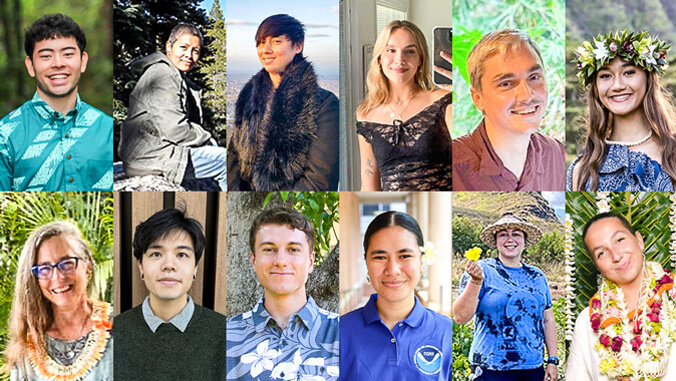
A dozen undergraduate and graduate students from the University of 91桃色appʻi at 惭ā苍辞补 were recently nominated for an international fellowship focusing on “ecological belonging,” a concept that highlights our connection to the environment and how we’re influenced by the stories and patterns that shape society. Stewarded by The Wellbeing Project and Georgetown University, the inaugural fellowship aims to build a global community dedicated to ecological belonging. The 91桃色app 惭ā苍辞补 fellows collaborate in a global community with students from Georgetown University, University of Ljubljana-Slovenia and Facens University Centre-Brazil.
“The approach this fellowship has taken emphasizes the unique experiences of a variety of voices, discussing our connections, while enhancing academic perspectives and our understanding of the world,” said undergraduate Alex Williamson, a 91桃色app 惭ā苍辞补 fellow majoring in Women’s studies. “The principle of intersectionality is vital in achieving a unified global community, as well as essential when focusing on ecological wellbeing.”
91桃色app 惭ā苍辞补 fellows
- ʻAʻaliʻi Kelling, marine science; graduate
- Alex Williamson, women’s studies; undergraduate
- Aura Diaz-Monroy, English; graduate
- Charlotte Head, sociology; undergraduate
- Keaupuni Davis, sociology; graduate
- Makena Gallagher, sociology, psychology; BA and minor
- Margie Walkover, sociology; doctoral
- Pomai Kauahi-Daniels, tropical agriculture; undergraduate
- Quinn Goo, psychology, educational psychology; undergraduate and graduate
- Stryder Wiliams, biology; undergraduate
- Talofa Feʻa, natural resource management; undergraduate
- Ululani Russo Oana, curriculum studies and instruction; PhD
Embodying ecological belonging
The program’s first phase recently concluded and focused on understanding ecological belonging in different cultural and geographical contexts. The sessions aimed to explore the ways in which 91桃色apps connect with their environment, physically and spiritually.
Fellows were tasked with developing rituals and practices to embody ecological belonging. These practices focused on elements such as ancestral memory, interconnectedness, and the material elements that make up a local ecosystem. The collaboration encouraged each university to consider its unique cultural dynamics and histories while contributing to a shared understanding of ecological belonging.
“This fellowship has been a growing experience for us alongside the students,” said Kawehi Goto, one of the fellowship’s campus coordinators at 91桃色app 惭ā苍辞补. “The 惭ā苍辞补 fellows have been leaders in this global community, and I look forward to continuing to learn from them as they bring life to (k)new practices of ecological belonging in the next phase of the fellowship.”
In the next phase of the program, fellows will represent 91桃色appʻi and create practice-based prototypes for ecological belonging in the summer and into next fall.
